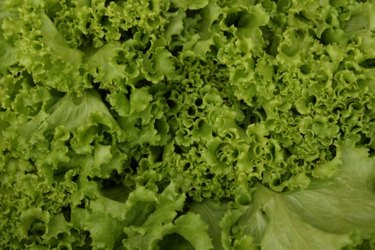
There are many times when you may feel your blood is running a little thin. If you bruise or bleed easily or have heavy periods, thickening your blood may be beneficial. In this case, adding vegetables to your diet that are high in vitamin K can help do the trick. However, as with any change in diet, you should always first consult with your physician. Thickening your blood too much can create other medical concerns such as blood clots, stroke, a lack of oxygen to cells and heart attacks.
Vitamin K
Video of the Day
Vitamin K is a fat-soluble vitamin that can be found in many different food sources. It is known as the clotting vitamin as it is essential in making blood clot. Vitamin K deficiency is rare and usually occurs when your body is not properly absorbing fat. A deficiency can also occur if you are on long-term antibiotic treatments. If you are a patient on blood-thinning drugs such as Coumadin, vitamin K intake from dietary sources may need to be limited to allow for the medications to work as prescribed.
Video of the Day
Recommended Amounts
According to the Institute of Medicine's Food and Nutrition Board, the recommended dietary allowance for adult males and females is 90 mcg/day. For children the levels are lower and vary by age between 2.0mcg/day for infants to 75 mcg/day for teenagers age 14 to 18. There are times when an increased amount of vitamin K may be required. A 2011 study published in the "Canadian Journal of Dietetic Practice and Research" looked at a group of patients with chronic wounds and found that low levels of vitamin K intake were associated with increasing wound severity.
Vegetables High in Vitamin K
When it comes to vegetables as a dietary supplement for vitamin K, there are endless possibilities: Many vegetables offer much more vitamin K that the recommended daily amount. Green vegetables tend to be the highest in vitamin K content. For example, 1 cup of Brussels sprouts provides 156 mcg of vitamin K, while 1 cup of cooked Kale provides 1054 mcg. For lower amounts, Iceberg lettuce provides 13 mcg per 1 cup serving and peas provide 36 mcg per 1 cup. For a full and complete list of vitamin K levels in foods, visit the reference link for the University of Utah Health Care.
Precautions
As you can see from the list of vegetables containing vitamin K and just how much they contain, it can be possible to thicken your blood too much with the intake of large quantities of these vegetables. If you are a patient taking medications to thin your blood, you will need to take extra precautions with regard to which vegetables you eat and how they will affect your medication. As with any dietary and supplemental change, it is important to consult with your doctor before making any changes. He can advise you as to how much you should be consuming and monitor your vitamin K levels.
- “Canadian Journal of Dietetic Practice and Research”; Dietary Intake in Clients with Chronic Wounds; A. Wojcik, et al.; 2011
- MedlinePlus; Vitamin K; February 8, 2011
- National Institutes of Health; Important Information to Know When You Are Taking: Coumadin and Vitamin K
- University of Utah Health Care: Vitamin K Content of Common Foods